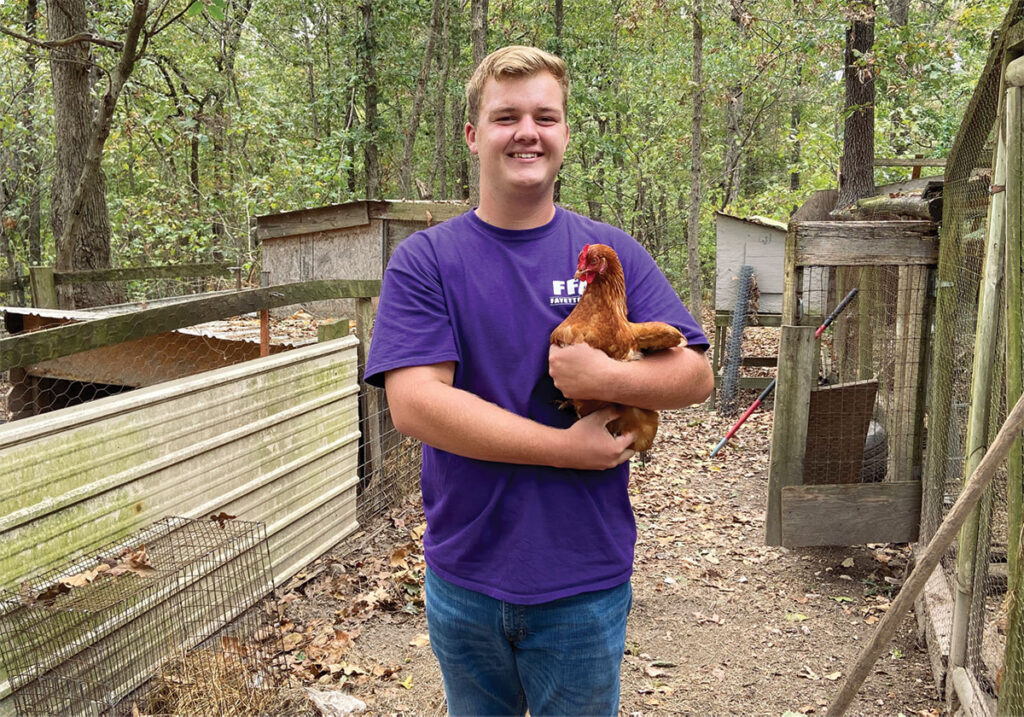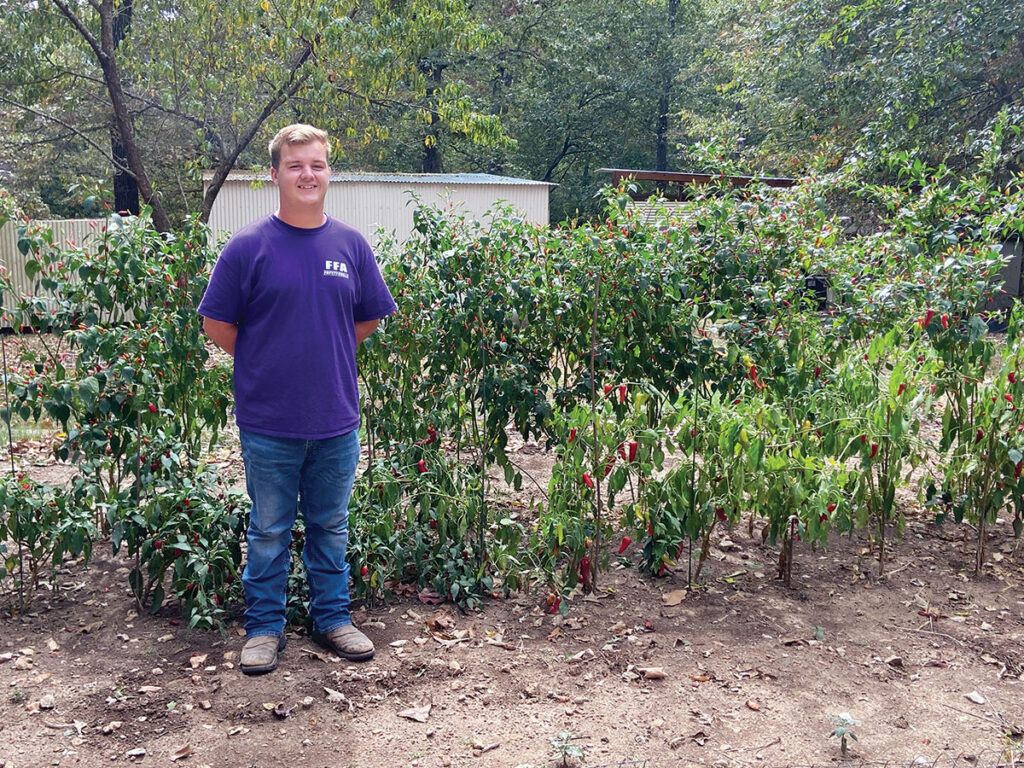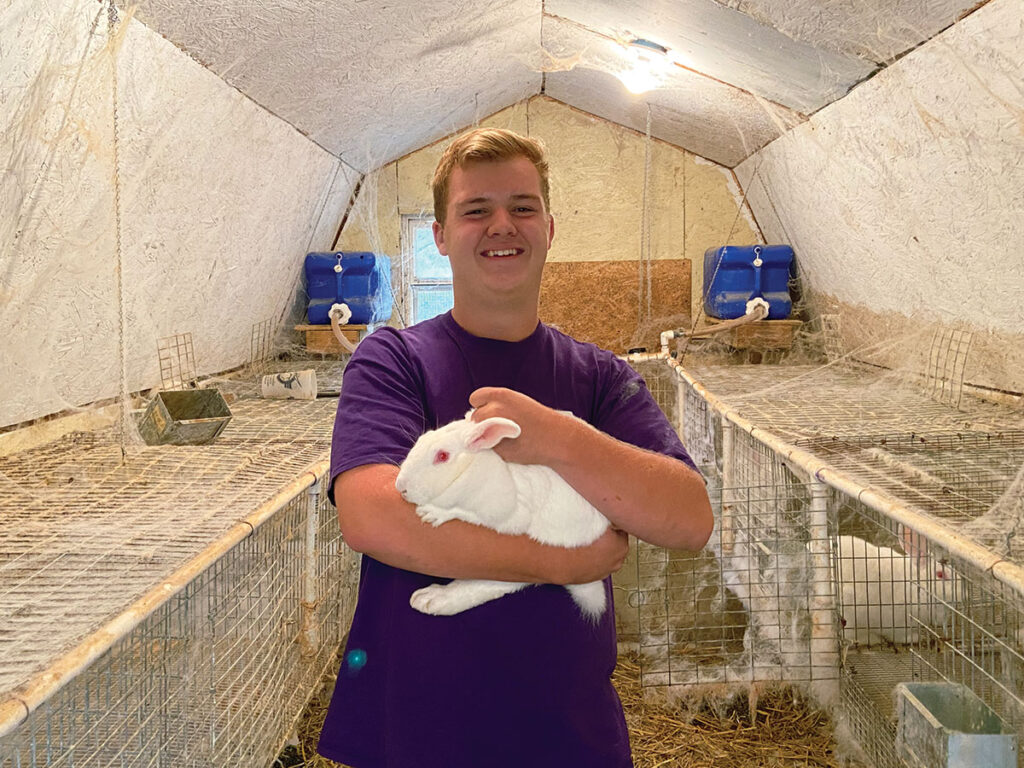
Cason Frisby has several production areas he participates in, with more to come
WEST FAYETTEVILLE, ARK. – At his family home in West Fayetteville, Ark., high school senior Cason Frisby grows vegetables, raises pigs and chickens, and is learning the ins and outs of meat rabbit production.
His work with FFA has earned him the 2021 Arkansas State Proficiency Award for Diversified Agriculture Production. His application received a gold ranking at the national level.
“I’ve been in the garden since I was probably 2 years old,” he recalled. “The fairy tale barnyard kind of thing…I guess you could say it intrigues a younger kid. As for the animals, I just like interacting with them.”
Farming runs on both sides of Cason’s family. His father, Jimmy Frisby, has taught agriculture at Fayetteville High School for 31 years. His mother’s father, Doyle Morgan, is in his 80s and still raising beef cattle. The manure from his grandfather’s herd fertilizers Cason’s gardens.
“I love the end product, how you put in so much work in the spring, and then you harvest all throughout the summer,” said Cason. He now has three plots: one at home, one in Prairie Grove and one in South Fayetteville. “All of them have different soil compositions, and I’ve learned what works best where.”
At home, he grows peppers and green beans. Tomatoes, corn and okra thrive in Prairie Grove, and South Fayetteville’s soil supports green beans, cowpeas and sweet corn. His summer crops sell at the Prairie Grove Farmers Market, where other vendors share their tips and mentor Cason. The smaller fall yield is just for him and his family.
Cason has many connections throughout the community and draws on the knowledge of more experienced farmers. “I’m always looking for ways to be more sustainable,” he explained. “I try to rotate where I put different crops so they’re more evenly taking nutrients from the soil. The rabbits give great manure, but you don’t get a lot from four does and two bucks. With the cows, you get a lot more.”
Cason’s first forays into livestock began when he was 6 years old.
“I had six chickens andd they were just for eggs, then,” Cason recalled He used to raise Black Jersey Giants and showed them at the Washington County Fair. When he was 14, he joined FFA and started getting chicks from them. He still gets Hy-Line Browns from FFA and sells the surplus back to the community.

Soon after getting his first chickens, Cason joined 4-H, where he expanded his agricultural knowledge and honed his leadership skills. He spent eight years in the Bethel Grove 4-H Club, first as a member, then as treasurer and finally as president.
When he was 7, his family bought purebred Durocs, and he showed these at the Washington County Fair as well.
More recently, Cason and his parents, Jimmy and Monica Frisby, have raised crossbred feeder pigs. Comparing the different breeds’ good and bad qualities has been interesting, he noted.
“It was really educational, seeing how fast the crossbreeds we got from the University of Arkansas research farm outgrew the ones we bought from our neighbors,” Cason explained. “It was just incredible.”
Though he’s lived in Fayetteville all his life, Cason takes a worldly approach to agriculture.
“Neither me nor my dad had any clue about rabbit production, but I was interested in doing a small mammal of some sort,” he said. “I’d read about how, in places like India, where poultry’s not a big thing, they do small mammals that are really efficient with feed. So, that got me interested.”
Cason now has six New Zealand white rabbits. His father’s colleague at the high school, Ellen Reynolds, and her husband Caleb run a rabbitry in Bentonville. Caleb also manages farms for Pel-Freez. This winter, under the Reynolds’ guidance, Cason plans to convert an old shed to a rabbit barn.
“Next spring, I’ll go into commercial production with Pel-Freez out of Rogers,” he said. “For that, I’ll start with 30 does.”
After graduating from Fayetteville High, Cason plans to attend the U of A next year and major in food science.
“I’m really good at chemistry, so I’ve been interested more in the product development, lab science side of things,” he explained. “In industries, a lot of times, you have an engineer who knows how to draw something on paper versus the person who builds it and figures out that it doesn’t really work in real life. Seeing the production ag side should help me with the food science, seeing the consumer-world applications.”
Though excited about the National FFA Convention, Cason wasn’t sure if he would go. He does competitive marching band at Fayetteville High and mentioned that they’re “running around a lot right now.” If this year’s FFA Convention doesn’t work out, he’ll most likely try again next year, this time focusing on rabbit production.
Though he plans to focus on product development as a career, Cason will keep his various agricultural projects going as a “side hustle.” “Next year,” he said, nodding proudly toward the future rabbit barn, “when I start this commercially, it’ll be my first business.”








